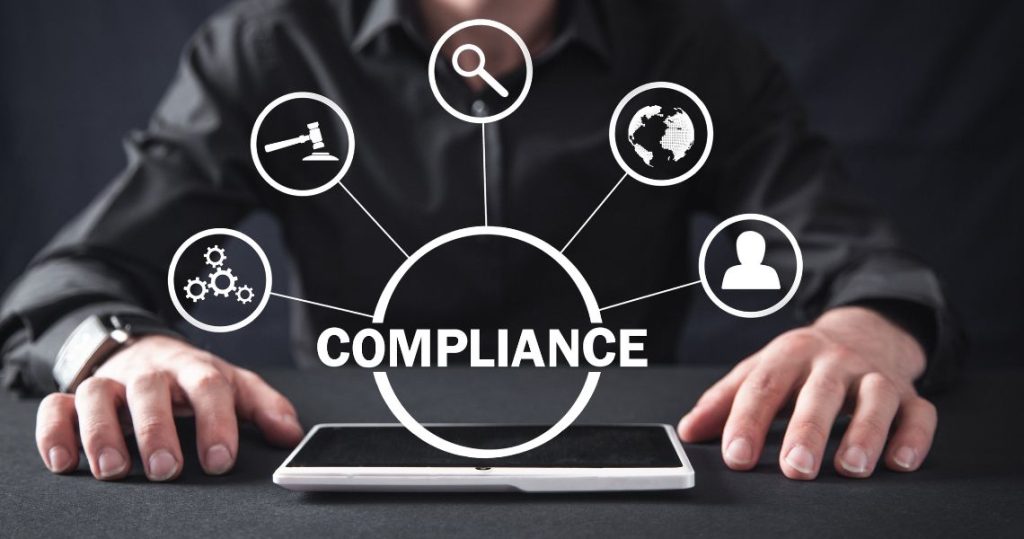
Book a Free Consultation!
✅Builders CFO Program
✅Business Improvement Program
✅Taxation Advice

Why it pays to be compliant
When you read compliance, you might automatically think of restrictions and regulatory standards. However, business compliance is more than just keeping you out of trouble.
Compliance plays a part in building trust and your business’ success.
How compliance benefits your business
Compliance is more than simply meeting legal and industry obligations, and shapes how we operate, who we work with, and the values we hold.
As well as helping you avoid hefty fines, it can:
- Increase customer trust and competitive edge
Customers want to work with businesses who operate ethically and responsibly. Being compliant can also be a competitive difference and increase your credibility. - Open up more partnership and supplier opportunities
Businesses often use compliance standards and adherence as a way to assess your level of trustworthiness, seeking out companies that uphold their standards. - Reduce risks
Creating a culture of compliance helps you avoid non-compliance penalties, improve operational transparency, and reduce risks. - Enhance operational efficiency
Integrating compliance frameworks into your workflows and processes not only reduces operational risks but helps you streamline compliance requirements.
However, it can be tricky to keep up with compliance obligations amongst the day to day. To help you assess your level of compliance, our business advisors share their handy checklist.
Your business compliance check-list
Taxation and superannuation
When it comes to tax, being proactive and informed about your tax obligations are key. Here, it’s important to:
- Complete annual reviews and declarations, including:
- Annual tax returns
- Lodge quarterly or monthly Business Activity Statements (BAS), if applicable
- Lodge monthly Instalment Activity Statements (IAS), if applicable
- Keep your business details up to date
- Maintain statutory business records
- Pay and report employee superannuation
Superannuation contribution requirements have now also changed, with the sugar guarantee (SG) rate increasing to 12% from 1 July 2025.
ASIC
Operating as a company? You will need to be registered with ASIC (the Australian Securities and Investments Commission). With this comes ongoing obligations, including:
- Paying your annual fees
- Ensuring your registration details are up to date
- Keeping proper financial and business records
Not sure what you need to comply with or are moving into a company structure? Our business advisors can step you through the process.
Employment and fairwork
When it comes to employment, it’s important to:
- Pay your staff correctly under the relevant Modern Award or Enterprise Agreement
- Provide all employees with written employment contracts outlining conditions
- Maintain employment records that include hours worked, leave entitlements, and salary contributions
- Adhere to National Employment Standards (NES) requirements
- Track accrued Long Service Leave for all employees
Payroll tax
Payroll tax is paid on employee wages over a monthly threshold and differs from state to state. Here in Victoria, companies with wages over $83,333 per month (or $1 million per annum) are obligated to pay payroll tax.
As these new thresholds come into effect from 1 July 2025, we recommend reviewing your obligations now to ensure you remain compliant.
Outside of Victoria? We recommend reviewing the Payroll Tax websiteor chatting to our business advisors to understand your obligations.
WorkCover and workers compensation
WorkCover insurance (SafeWork in NSW and SA, and WorkSafe for all other states) is generally required for all companies that employ workers. While there are some exemptions, we recommend reviewing your obligations earlier rather than later – especially as business penalties could be as high as $200,000.
Paying your personal salary through your company? You’ll need to register for WorkCover as you are considered an employee.
Work health and safety
Also known as occupational health and safety, work health and safety (WHS) laws include not only employee safety but that of your customers and visitors.
To ensure WHS compliance, it’s important to have policies and procedures in place that create a safe work environment. This includes:
- Supplying and ensuring safe use, handling and storage of machinery, structures and substances
- Providing and maintaining adequate and safe facilities
- Having controls in place to minimise physical and psychosocial hazards
- Providing adequate safety information, training, instruction and supervision
- Monitoring health and conditions of your workplace
Licenses and permits
Each and every industry has different licenses and permits for operation. However, some have more industry compliance requirements than others, including:
- Building and construction
- Food and hospitality
- Security, health, education, and transport
This is where working with a business advisor that has experience in your sector can make a difference, ensuring you get proactive advice for your sector. Here at Mead Partners, we support a range of industries but are also building and construction business advisor specialists.
Privacy and cybersecurity considerations
Data is fast becoming the backbone of business operations, being leveraged for everything from insights to customer management and beyond. And with all this data comes additional privacy and cyber security obligations.
At a minimum, our business advisors recommend having:
- Data management policies and safe data handling procedures
- Data breach and cyber incident response plans
- Regularly conduct cyber awareness and safe data handling training
- Privacy policies in place relating to how you’re keeping your customer data safe and secure
Council & Environmental Compliance
It’s important to ensure you’re compliant with any local council and environmental compliance requirements. This extends to:
- Valid council permits for signage, trading hours, or food service.
- Environment Protection Authority (EPA) regulations for waste, noise, or emissions.
To learn more about EPA obligations for Victoria, you can check out the EPA website or chat to our business advisory team.
Building & Construction Industry Compliance
As building and construction business advisors, we’ve seen where it can go wrong. Especially as the industry carries several additional regulatory and reporting requirements, including:
- Contractor Reporting (TPAR):
Required by those paying contractors and construction services, Taxable Payments Annual Reports (TPAR) are required by 28 August each year. - Building Licences & Registrations:
All builders, site supervisors, and tradespeople must hold valid and current state-based building licences (e.g. VBA in Victoria, QBCC in Queensland). - Security of Payments Legislation:
Businesses must make timely payments to subcontractors and issue proper issuance of payment claims and schedules. - Construction Contracts Act / SOPA compliance:
Payment schedules need to be issued within required timeframes or risk automatic liability for full claims. - Portable Long Service Leave:
Applicable to VIC, QLD and NSW, you could be required to register and report on construction workers’ portable long service leave schemes. - Safe Work Method Statements (SWMS):
Required for all high-risk construction work, SWMS’ must be site-specific, up to date, and followed on site. - Apprentice & Trainee Registration:
If you hire apprentices, they must be properly registered and supported through a Registered Training Organisation (RTO). - Environmental and Planning Approvals:
Site-specific environmental, zoning, or development requirements may be required by local councils and state planning authorities.

Send To Someone